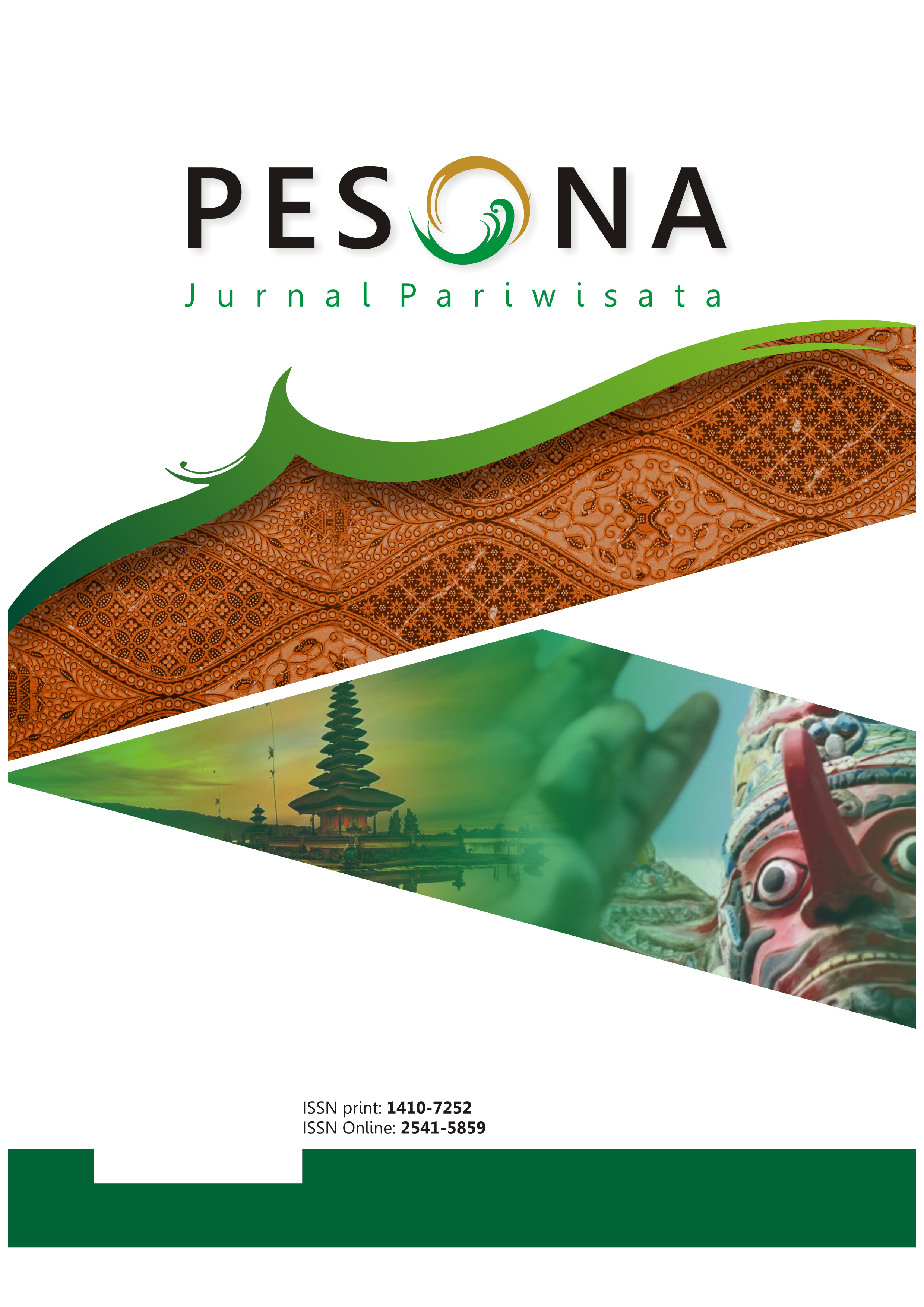Analysis of halal tourism potential from the perspective of a holistic travel experience in Banten province
Keywords:
behavioral intentions, destination management, halal tourism, tourist satisfaction, religiosityAbstract
This research explores the factors that affect tourist satisfaction in halal tourism, with a particular emphasis on Banten Province. The results indicate that although halal accommodations are necessary, they are seen more as a fundamental requirement than a significant driver of satisfaction. Conversely, the presence and quality of halal facilities and services are key to elevating the overall tourist experience. Additionally, the attitudes and behaviors of residents, as well as the destination's ability to provide a break from daily life, greatly influence tourist satisfaction. Religiosity stands out as a crucial moderating factor, enhancing the positive impact of halal accommodations and facilities on satisfaction. For tourists with strong religious beliefs, the adherence of services to Islamic principles is vital. This study highlights the importance of incorporating religiosity into the development and marketing of tourism products to maximize the potential of halal tourism, especially in areas like Banten Province. By focusing on comprehensive travel experiences that address both spiritual and practical needs, destinations can increase tourist satisfaction, foster loyalty, and encourage positive word-of-mouth, thereby supporting sustainable growth in the halal tourism industry.
Downloads
References
Adamsah, B., Ganjar, D., & Subakti, E. (2022). Perkembangan Industri Halal Terhadap Pertumbuhan Ekonomi Manusia. Indonesia Journal of Halal, 5(1), 71–75. https://ejournal2.undip.ac.id/index.php/ijh/article/view/14416
Ahmed, H. M. (2023). Indonesia Leads 2023 Global Halal Tourism Index. https://www.halaltimes.com/indonesia-leads-2023-global-halal-tourism-index/
Ahmed Osman, O. (2023). The Importance of Halal Food and Its Legality in Both Islamic and Non-Islamic Communities Around the World. In Halal and Kosher Food (pp. 1–15). Springer International Publishing. https://doi.org/10.1007/978-3-031-41459-6_1
Alamineh, G. A., Hussein, J. W., Endaweke, Y., & Taddesse, B. (2023). The local communities’ perceptions on the social impact of tourism and its implication for sustainable development in Amhara regional state. Heliyon, 9(6), e17088. https://doi.org/10.1016/j.heliyon.2023.e17088
Amissah, E. F., Addison-Akotoye, E., & Blankson-Stiles-Ocran, S. (2022). Service Quality, Tourist Satisfaction, and Destination Loyalty in Emerging Economies (pp. 121–147). https://doi.org/10.1007/978-3-030-83711-2_6
Aulet, S., & Vidal, D. (2018). Tourism and religion: sacred spaces as transmitters of heritage values. Church, Communication and Culture, 3(3), 237–259. https://doi.org/10.1080/23753234.2018.1542280
Bagheri, F., Guerreiro, M., Pinto, P., & Ghaderi, Z. (2023). From Tourist Experience to Satisfaction and Loyalty: Exploring the Role of a Sense of Well-Being. Journal of Travel Research. https://doi.org/10.1177/00472875231201509
Battour, M., & Ismail, M. N. (2016). Halal tourism: Concepts, practises, challenges and future. Tourism Management Perspectives, 19, 150–154. https://doi.org/10.1016/j.tmp.2015.12.008
Breiby, M. A., Duedahl, E., Øian, H., & Ericsson, B. (2020). Exploring sustainable experiences in tourism. Scandinavian Journal of Hospitality and Tourism, 20(4), 335–351. https://doi.org/10.1080/15022250.2020.1748706
Darusalam, A., Amrizal, Erion, Sinunglingga, G., & Koesmawan. (2024). Analisis Daya Saing Pariwisata Halal di Provinsi Banten. Al-Kharaj: Jurnal Ekonomi, Keuangan & Bisnis Syariah, 6(4), 5092–5106.
Dillette, A. K., Douglas, A. C., & Andrzejewski, C. (2021). Dimensions of holistic wellness as a result of international wellness tourism experiences. Current Issues in Tourism, 24(6), 794–810. https://doi.org/10.1080/13683500.2020.1746247
Eldaw, A., & Ahmed Osman, O. (2023). Dilemma and Concepts of Halal-Safe Food. In Halal and Kosher Food (pp. 17–28). Springer International Publishing. https://doi.org/10.1007/978-3-031-41459-6_2
Hair, J. F., Hult, G. T. M., Ringle, C. M., Sarstedt, M., Danks, N. P., & Ray, S. (2021). An Introduction to Structural Equation Modeling. https://doi.org/10.1007/978-3-030-80519-7_1
Han, H., Al-Ansi, A., Koseoglu, M. A., Lin, P. M. C., Park, J., Yu, J., & Kim, W. (2019). Halal tourism: travel motivators and customer retention. Journal of Travel & Tourism Marketing, 36(9), 1012–1024. https://doi.org/10.1080/10548408.2019.1683483
Han, H., Al-Ansi, A., Olya, H. G. T., & Kim, W. (2019). Exploring halal-friendly destination attributes in South Korea: Perceptions and behaviors of Muslim travelers toward a non-Muslim destination. Tourism Management, 71, 151–164. https://doi.org/10.1016/j.tourman.2018.10.010
Iliev, D. (2020). The evolution of religious tourism: Concept, segmentation and development of new identities. Journal of Hospitality and Tourism Management, 45, 131–140. https://doi.org/10.1016/j.jhtm.2020.07.012
Jeaheng, Y., Al-Ansi, A., & Han, H. (2020). Impacts of Halal-friendly services, facilities, and food and Beverages on Muslim travelers’ perceptions of service quality attributes, perceived price, satisfaction, trust, and loyalty. Journal of Hospitality Marketing & Management, 29(7), 787–811. https://doi.org/10.1080/19368623.2020.1715317
Jia, X., & Chaozhi, Z. (2020). “Halal tourismâ€: is it the same trend in non-Islamic destinations with Islamic destinations? Asia Pacific Journal of Tourism Research, 25(2), 189–204. https://doi.org/10.1080/10941665.2019.1687535
Junaidi, J. (2020). Halal-friendly tourism and factors influencing halal tourism. Management Science Letters, 1755–1762. https://doi.org/10.5267/j.msl.2020.1.004
K Kenedi, Sukmawan I, & Laksana A. (2022). Evaluation of the economic potential of coastal tourism strategic area of anyer tourism–cinangka. Jurnal Ekonomi, 11(1), 611–618.
Kala, D., & Chaubey, D. S. (2024). Pro-Environmental Behavior of Religious Tourists: Moderating Role of Religious Beliefs. Cornell Hospitality Quarterly, 65(1), 105–119. https://doi.org/10.1177/19389655231182090
Kandampully, J., Bilgihan, A., Van Riel, A. C. R., & Sharma, A. (2023). Toward Holistic Experience-Oriented Service Innovation: Co-Creating Sustainable Value With Customers and Society. Cornell Hospitality Quarterly, 64(2), 161–183. https://doi.org/10.1177/19389655221108334
Karakan, H. I. & B. K. (2023). Revisit Intention: a Key Concept in Tourism1. International Theory, Research and Reviews in Social, Human and Administrative Sciences, October, 339.
Kenedi, K., Septiyani, R. D., Laksana, A., & Azhar, I. N. (2024). TOURIST REVISIT INTENTION IN POST COVID-19 PANDEMIC: A MODIFIED PERSPECTIVE FROM THE THEORY OF PLANNED BEHAVIOUR (TPB) WITH A FOCUS ON DESTINATION IMAGE. Bussman Journal: Indonesian Journal of Business and Management, 4(2), 283–293. https://doi.org/10.53363/buss.v4i2.227
Kock, N., & Lynn, G. S. (2012). Lateral collinearity and misleading results in variance-based SEM: An illustration and recommendations. Journal of the Association for Information Systems, 13(7), 546–580. https://doi.org/10.17705/1jais.00302
Laksana, A., Huda, M., & Kenedi, K. (2023). Analysis of tourism carrying capacity at KSPP Tanjung Lesung as part of sustainable marine tourism development. TEKNIKA: JURNAL SAINS DAN TEKNOLOGI, 19(02), 114–121.
Laksana, A., Kenedi, K., & Permana, B. R. S. (2022). Digital Tourism Development Strategy as A Promotion of Creative Economy Tourism In Banten Province. Jurnal Ekonomi, 11(01), 631–638. https://ejournal.seaninstitute.or.id/index.php/Ekonomi/article/view/376
Li, T. (Tina), Liu, F., & Soutar, G. N. (2021). Experiences, post-trip destination image, satisfaction and loyalty: A study in an ecotourism context. Journal of Destination Marketing & Management, 19, 100547. https://doi.org/10.1016/j.jdmm.2020.100547
Liro, J. (2024). The interdependencies of religious tourists’ attributes and tourist satisfaction in the light of contemporary socio-cultural changes. Current Issues in Tourism, 27(3), 356–360. https://doi.org/10.1080/13683500.2023.2214852
Mastercard-CrescentRating. (2023). Global Muslim Travel Index 2023. https://www.crescentrating.com/
Melissa Tsai, H.-Y. (2021). Exploring the motivation-based typology of religious tourists: A study of Welcome Royal Lord Festival. Journal of Destination Marketing & Management, 21, 100623. https://doi.org/10.1016/j.jdmm.2021.100623
Mohd Yousoof, F. B., Pang, C. Y., Akbar, M. A., & Thas Taker, M. A. (2023). THE ROLE OF HALAL-FRIENDLY HOSPITALITY SERVICES IN INCREASING VISIT INTENTION: A MUSLIM TOURIST PERSPECTIVE. International Journal of Islamic Business, 8(2), 1–17. https://doi.org/10.32890/ijib2023.8.2.1
Nguyen, D. T., Kuo, K.-C., Lu, W.-M., & Nhan, D. T. (2024). How Sustainable Are Tourist Destinations Worldwide? An Environmental, Economic, and Social Analysis. Journal of Hospitality & Tourism Research, 48(4), 698–711. https://doi.org/10.1177/10963480231168286
Nisha, F., & Cheung, C. (2022). Locating Muslimah in the travel and tourism research. Tourism Management Perspectives, 41(March 2021), 100940. https://doi.org/10.1016/j.tmp.2022.100940
P.J., S., Singh, K., Kokkranikal, J., Bharadwaj, R., Rai, S., & Antony, J. (2023). Service Quality and Customer Satisfaction in Hospitality, Leisure, Sport and Tourism: An Assessment of Research in Web of Science. Journal of Quality Assurance in Hospitality & Tourism, 24(1), 24–50. https://doi.org/10.1080/1528008X.2021.2012735
Papadopoulou, N. M., Ribeiro, M. A., & Prayag, G. (2023). Psychological Determinants of Tourist Satisfaction and Destination Loyalty: The Influence of Perceived Overcrowding and Overtourism. Journal of Travel Research, 62(3), 644–662. https://doi.org/10.1177/00472875221089049
Papastathopoulos, A., Kaminakis, K., & Mertzanis, C. (2020). What services do Muslim tourists want? Uncovering nonlinear relationships and unobserved heterogeneity. Tourism Management Perspectives, 35(January), 100720. https://doi.org/10.1016/j.tmp.2020.100720
Peng, J., Yang, X., Fu, S., & Huan, T.-C. (T. C. . (2023). Exploring the influence of tourists’ happiness on revisit intention in the context of Traditional Chinese Medicine cultural tourism. Tourism Management, 94, 104647. https://doi.org/10.1016/j.tourman.2022.104647
Ponte, J., Couto, G., Sousa, Ã., Pimentel, P., & Oliveira, A. (2021). Idealizing adventure tourism experiences: tourists’ self-assessment and expectations. Journal of Outdoor Recreation and Tourism, 35, 100379. https://doi.org/10.1016/j.jort.2021.100379
Rahman, M., Moghavvemi, S., Thirumoorthi, T., & Rahman, M. K. (2020). The impact of tourists’ perceptions on halal tourism destination: a structural model analysis. Tourism Review, 75(3), 575–594. https://doi.org/10.1108/TR-05-2019-0182
Rasul, T. (2019). The trends, opportunities and challenges of halal tourism: a systematic literature review. Tourism Recreation Research, 44(4), 434–450. https://doi.org/10.1080/02508281.2019.1599532
Reiman, A., & Väyrynen, S. (2018). Holistic well-being and sustainable organisations – A review and argumentative propositions. International Journal of Sustainable Engineering, 11(5), 321–329. https://doi.org/10.1080/19397038.2018.1474397
Rejikumar, G., Ajitha, A. A., Jose, A., & Mathew, S. (2021). Strategic positioning of tourist destinations- analyzing the role of perceived meaningfulness. Journal of Hospitality and Tourism Management, 49, 140–151. https://doi.org/10.1016/j.jhtm.2021.08.025
Reyes, K. T. D. L., & Dael, R. J. (2023). Influence of Destination Image and Tourist Satisfaction On Destination Loyalty. British Journal of Multidisciplinary and Advanced Studies, 4(3), 46–61. https://doi.org/10.37745/bjmas.2022.0225
Rusu, V., Rusu, C., Matus, N., & Botella, F. (2023). Tourist Experience Challenges: A Holistic Approach. Sustainability, 15(17), 12765. https://doi.org/10.3390/su151712765
Schönherr, S., Peters, M., & KuÅ¡Äer, K. (2023). Sustainable tourism policies: From crisis-related awareness to agendas towards measures. Journal of Destination Marketing & Management, 27, 100762. https://doi.org/10.1016/j.jdmm.2023.100762
Sebova, L., Marcekova, R., Simockova, I., & Pompurova, K. (2023). Experience Tourism as a Smart and Sustainable Form of Tourism in the Twenty-First Century (pp. 189–199). https://doi.org/10.1007/978-3-031-26829-8_12
Shah, S. A. A., Fianto, B. A., Sridadi, A. R., & Kayani, U. (2023). A Master Conceptual Framework of Research in Halal Tourism. Tourism, 71(1), 121–144. https://doi.org/10.37741/t.71.1.8
Sharin, F. H., Sentosa, I., Spraggon, M., Indiani, N. L. P., & Amerta, I. M. S. (2024). Reshaping Tourism Industry in Indonesia: The Attraction of Halal Tourism Practices and the Drive of Digitainability. In Emerging Technology and Crisis Management in The Halal Industry (pp. 105–121). Springer Nature Singapore. https://doi.org/10.1007/978-981-97-1375-2_7
Sobari, N., Kurniati, A., & Usman, H. (2022). The influence of Islamic attributes and religious commitments toward halal wellness services customer satisfaction and loyalty. Journal of Islamic Marketing, 13(1), 177–197. https://doi.org/10.1108/JIMA-11-2018-0221
Soni, G., Hussain, S., & Shah, F. A. (2024). The Tourist Psychology and the Creation of Tourist Experiences (pp. 1–15). https://doi.org/10.1007/978-981-99-3895-7_6-1
Suhartanto, D., Dean, D., Wibisono, N., Astor, Y., Muflih, M., Kartikasari, A., Sutrisno, R., & Hardiyanto, N. (2021). Tourist experience in Halal tourism: what leads to loyalty? Current Issues in Tourism, 24(14), 1976–1990. https://doi.org/10.1080/13683500.2020.1813092
Suhartanto, D., Marwansyah, M., Muflih, M., Najib, M. F., & Faturohman, I. (2019). Loyalty formation toward Halal food. British Food Journal, 122(1), 48–59. https://doi.org/10.1108/BFJ-03-2019-0188
Sulaiman, Z. A., Iranmanesh, M., Foroughi, B., & Rosly, O. (2022). The impacts of Shariah-compliant hotel attributes on Muslim travellers revisit intention: religiosity as a moderator. Journal of Islamic Marketing, 13(10), 2108–2125. https://doi.org/10.1108/JIMA-06-2020-0179
Terzidou, M., Scarles, C., & Saunders, M. N. K. (2018). The complexities of religious tourism motivations: Sacred places, vows and visions. Annals of Tourism Research, 70, 54–65. https://doi.org/10.1016/j.annals.2018.02.011
Villani, D., Sorgente, A., Iannello, P., & Antonietti, A. (2019). The Role of Spirituality and Religiosity in Subjective Well-Being of Individuals With Different Religious Status. Frontiers in Psychology, 10. https://doi.org/10.3389/fpsyg.2019.01525
Volgger, M., Erschbamer, G., & Pechlaner, H. (2021). Destination design: New perspectives for tourism destination development. Journal of Destination Marketing & Management, 19, 100561. https://doi.org/10.1016/j.jdmm.2021.100561
Wang, S., Wang, J., Li, J., & Zhou, K. (2020). How and when does religiosity contribute to tourists’ intention to behave pro-environmentally in hotels? Journal of Sustainable Tourism, 28(8), 1120–1137. https://doi.org/10.1080/09669582.2020.1724122
Yaden, D. B., Batz-Barbarich, C. L., Ng, V., Vaziri, H., Gladstone, J. N., Pawelski, J. O., & Tay, L. (2022). A Meta-Analysis of Religion/Spirituality and Life Satisfaction. Journal of Happiness Studies, 23(8), 4147–4163. https://doi.org/10.1007/s10902-022-00558-7
Zong, X., & Cheah, C. S. L. (2023). Multiple dimensions of religiosity, self-regulation, and psychological adjustment among emerging adults. Current Psychology, 42(5), 4133–4142. https://doi.org/10.1007/s12144-021-01780-x
Downloads
Published
How to Cite
Issue
Section
License
Copyright (c) 2025 Jurnal Pariwisata Pesona

This work is licensed under a Creative Commons Attribution-ShareAlike 4.0 International License.

This work is licensed under a Creative Commons Attribution-ShareAlike 4.0 International License.



